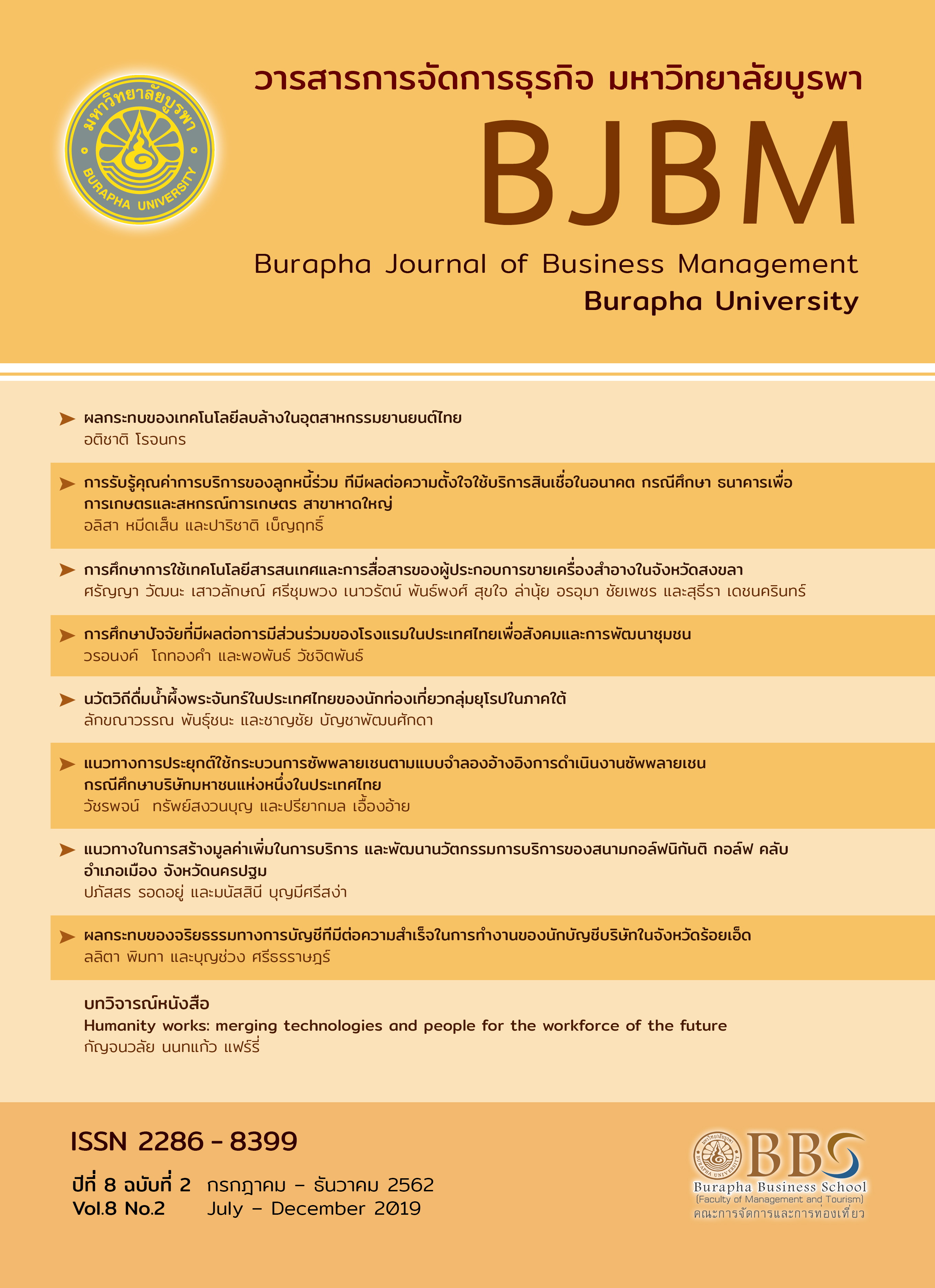การศึกษาปัจจัยที่มีผลต่อการมีส่วนร่วมของโรงแรมในประเทศไทย เพื่อสังคมและการพัฒนาชุมชน การมีส่วนร่วมของโรงแรม
Main Article Content
บทคัดย่อ
การมีส่วนร่วมในการดำเนินงานของโรงแรมเพื่อสังคมและการพัฒนาชุมชน เป็นแนวทางในการดำเนินธุรกิจที่สะท้อนให้เห็นถึงความรับผิดชอบต่อสังคมควบคู่กับการสร้างคุณค่าเพิ่มให้เติบโตอย่างยั่งยืน และคำนึงถึงผลประโยชน์ของผู้มีส่วนได้เสียทุกภาคส่วน งานวิจัยนี้มีวัตถุประสงค์เพื่อศึกษาการมีส่วนร่วมภายในโรงแรมในความรับผิดชอบต่อสังคมและการมีส่วนร่วมกับชุมชนในการพัฒนาด้านสังคม-วัฒนธรรม ด้านสิ่งแวดล้อม และด้านเศรษฐกิจของชุมชน เก็บข้อมูลโดยการส่งแบบสอบถามไปยังผู้จัดการของโรงแรม 1-5 ดาว ที่เป็นสมาชิกของสมาคมโรงแรมไทย ได้รับแบบสอบถามกลับคืนมาจำนวน 221 แห่ง ผลการวิจัยพบว่า โรงแรมระดับ 4-5 ดาว หรือโรงแรมที่มีพนักงานมากกว่า 300 คน มีกิจกรรมและส่วนร่วมในการดำเนินงานภายในและการพัฒนาชุมชนด้านสังคม-วัฒนธรรม ด้านสิ่งแวดล้อม ด้านเศรษฐกิจ สูงกว่ากลุ่มโรงแรมที่มีระดับดาวน้อยกว่า หรือจำนวนพนักงานน้อยกว่า และยังพบอีกว่าโรงแรมมีส่วนร่วมในการพัฒนาชุมชนด้านเศรษฐกิจน้อยกว่าด้านสังคมและสิ่งแวดล้อม ผลการวิจัยนำไปสู่การเพิ่มขีดความสามารถในการมีส่วนร่วมในกิจกรรมภายในของโรงแรมเพื่อสังคมและกิจกรรมการพัฒนาชุมชน อาทิ การร่วมมือกับธุรกิจในชุมชน การร่วมมือกับสถาบันการศึกษา โดยมีการบริหารจัดการโครงการที่ดีและมีประสิทธิภาพ
Article Details
บทความที่จะตีพิมพ์เพื่อเผยแพร่ในวารสารการจัดการธุรกิจ มหาวิทยาลัยบูรพา จะต้องเป็นบทความที่ไม่เคยได้รับการตีพิมพ์เผยแพร่หรืออยู่ระหว่างการพิจารณาเพื่อตีพิมพ์เผยแพร่ในวารสารอื่น ๆ ทั้งนี้ หากพบว่ามีการละเมิดลิขสิทธิ์ ด้วยข้อคิดเห็นที่ปรากฏและแสดงในเนื้อหาบทความต่าง ๆ ให้ถือว่าเป็นความเห็นและความรับผิดชอบโดยตรงของผู้เขียนบทความนั้น ๆ มิใช่ความเห็นและความรับผิดชอบใด ๆ ของคณะบริหารธุรกิจ มหาวิทยาลัยบูรพา สำหรับในกรณีผู้ประสงค์จะนำข้อความในวารสารการจัดการธุรกิจ มหาวิทยาลัยบูรพา ไปเผยแพร่ต้องได้รับอนุญาตจากกองบรรณาธิการวารสารการจัดการธุรกิจ มหาวิทยาลัยบูรพา ตามกฎหมายว่าด้วยลิขสิทธิ์
เอกสารอ้างอิง
ธินิกานต์ สังข์สุวรรณ. (2018). กิจกรรมการท่องเที่ยวเชิงสร้างสรรค์ที่เกาะเสม็ด. วารสารวิทยาลัยดุสิตธานี ปีที่ 12 ฉบับพิเศษ เดือนพฤษภาคม 2561. 356-367.
ระชานนท์ ทวีผล. (2558). การให้ความหมายและรูปแบบกิจกรรมความรับผิดชอบต่อสังคมของโรงแรมในเขตอำเภอหัวหิน จังหวัดประจวบคีรีขันธ์. วารสารการจัดการธุรกิจ คณะการจัดการและการท่องเที่ยว มหาวิทยาลัยบูรพา, 4(1), 24-37.
สานิตย์ หนูนิล, วิโรจน์ เจษฎาลักษณ์ และจันทนา แสนสุข. (2559). องค์ประกอบและรูปแบบของความรับผิดชอบต่อสังคมเชิงกลยุทธ์ธุรกิจโรงแรมในประเทศไทย. วารสารวิชาการสมาคมสถาบันอุดมศึกษาเอกแห่งประเทศไทยในพระราชูปถัมภ์สมเด็จพระเทพรัตนราชสุดาฯสยามบรมกุมารี, 22(2), 69-78.
หงสกุล เมสนุกูล. (2555). แนวทางการจัดการสิ่งแวดล้อมของธุรกิจที่พักตามมาตรฐานโรงแรมใบไม้สีเขียวของ Six Senses Hideaway เกาะยาวน้อย จังหวัดภูเก็ต. การประชุมวิชาการแห่งชาติ มหาวิทยาลัยเกษตรศาสตร์ วิทยาเขตกำแพงแสน ครั้งที่ 9, 686-697.
Abdel-Maksoud, A., Kamel, H., & Elbanna, S. (2016). Investigating relationships between stakeholders’ pressure, eco-control systems and hotel performance. International Journal of Hospitality Management, 59, 95-104.
Accor Hotels. 2016. Planet 21. Retrieved May 1, 2016, from https://www.accorhotels.com/gb/ sustainabledevelopment/index.shtml.
Amari Hotels Resort and Spa. (2018). Social responsibility. Retrieved July 8, 2018, from https://www.amari.com/social-responsibility/
Aref, F., & Ma’rof, R. (2009). “Assessing the level of community participation as a component of community capacity building for tourism development”. Euro. J. Soc. Sci. 8(1), 68-75.
Babbie, E. (2002). The basics of social research. Belmont, CA,: Wadsworth.
Barnard, C. I. (1968). The functions of the executive (Vol. 11): Harvard university press.
Brundtland Commission. (1987). World commission on environment and development. Our common future. Retrieved May 1, 2016, from https://public.wsu.edu/~susdev/WCED87.html.
Dusit Hotels and Resort. (2018). Corporate social responsibility. Retrieved June 11, 2018, from https://www.dusit.com/th/csr/online.
Elkington, J. (1997). “Cannibals with forks - the triple bottom line of twenty-first century Business”. Mankato, MN: Capstone.
Freeman, R.E. (1984). Strategic management: A stakeholder approach. Boston, Pitman. Retrieved May 1, 2016, from https://books.google.com/books.
Han, H., Hsu, L-T. J., Lee, J-S., & Sheu, C. (2011). Are lodging customers ready to go green? An examination of attitudes, demographics, and eco-friendly intentions. International Journal of Hospitality Management, 30(2), 345-355,
Hair, J. F., Black, W. C., Babin, B. J., & Anderson (2010). Multivariate data analysis (7thed.). New Jersey: Pearson Education
Hsieh, Y.-C. (2012). Hotel companies' environmental policies and practices: a content analysis of their web pages. International Journal of Contemporary Hospitality Management, 24(1), 97-121.
Mandy Nok Hotel. (2018). Corporate social responsibility. Retrieved October 10, 2018, from https://www.mandynokhotel.com/th/index.php
Masa’deh, R. E., Nasseef, M. A., Sunna, C., Suliman, M., & Albawab, M. (2017). The effect of hotel development on sustainable tourism development. International Journal of Business Administration, 8(4), 16.
Mensah, I. (2006). Environmental management practices among hotels in the greater Accra region. International Journal of Hospitality Management, 25(3), 414-431.
Mrema, A. A. (2015). Contribution of tourist hotels in socio-economic development of local communities in Monduli District, Northern Tanzania. Journal of Hospitality Management and Tourism, 6(6), 71-79
Muganda M, Sahli M, Smith KA (2010). Tourism’s contribution to poverty alleviation: A community perspective from Tanzania. Dev. Southern Afr. 27:629-646.
Porter, M. E., & Kramer, M. R. (2012). Shared value: die brücke von corporate social responsibility zu corporate strategy. In Corporate Social Responsibility. Berlin, Germany: Springer Gabler. 137-153.
Reed, M. S. (2008). Stakeholder participation for environmental management: a literature review. Biological Conservation, 141(10), 2417-2431.
Roseland, M. (2000). Sustainable community development: integrating environmental, economic, and social objectives. Progress in planning, 54(2), 73-132.
Royal Cliff Beach Hotels Group. (2018). Corporate social responsibility. Retrieved October 10, 2018, from https://www.royalcliff.com/th/online.
Thai Hotels Association. (2017). Member list. Retrieved March 27, 2017, from https://www. thaihotels. org/16750708/memberlist
The Legacy River Kwai Resort. (2018). Corporate social responsibility. Retrieved October 3, 2018, from https://thelegacyresort.takraonline.com/Blog/newsletter-categorylist.aspxonline
Thotongkam, W., & Vachajitpan, P. (2018). Involvement in community development of hotels in Thailand. Proceeding of 7th International Conference on Advancement of Development Administration 2018 Social Sciences and Interdisciplinary Studies (The 7th ICADA 2018-SSIS). National Institute of Development Administration (NIDA), Bangkok, Thailand, May 2018. 22.
UNCTAD (2007). FDI in tourism: the development dimension, UNCTAD current studies on FDI and development No.4, New York and Geneva, United Nations
Xu, X., & Gursoy, D. (2015). Influence of sustainable hospitality supply chain management on customers’ attitudes and behaviors. International journal of hospitality management, 49, 105-116.


